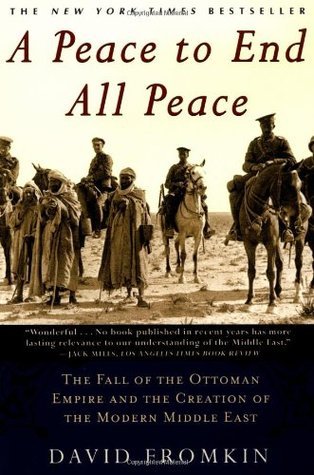This is a fantastic book. It covers the history of how the countries of the Middle East came to be, from the Great Game imperialist struggle between Britain and Russia in Asia (Fromkin has also written a great Foreign Affairs peace recounting that), to the Ottoman Empire’s two-front war during WWI where it somehow managed to hold off Britain and Russia. These were two of the great powers of the world at the time, and popular wisdom then was that either one of them alone should easily have overwhelmed the Ottoman Empire. That neither were able to would have drastic consequences later.
WWI had deadlocked in the trenches, and Britain tried to break the stalemate by attempting a naval-only attack upon the Ottoman Empire, whose control of the Dardanelles Strait was strangling the economy of Russia, which was Britain’s ally in WWI. No troops were initially deployed because War Minister Lord Kitchener refused to divert any troops from the trenches. Kitchener, who was a military legend, initially opposed this attack altogether and only changed his mind after Turkish forces invaded Russia, who asked Britain for help (ironically, by the time of the British attack, the Turkish invasion of Russia had already shot itself in the foot due to the military incompetence of the Turkish commander, Enver Pasha).
The naval attack came within a single row of mines of succeeding before the admiral in charge freaked out and gave up (for some reason, this brought to mind the deleted scene in Aliens where the automated sentry guns guarding the tunnel were quickly depleted to a handful of shells before the aliens gave up their assault). Only then did the British finally deploy land forces, but by this time, it was too late, Turkish reinforcements had arrived. Unwilling to admit defeat, the British troops dug in — but at the low ground at the beaches while the Turks held the high ground!
This front of the war at Gallipolli then goes on to cost the British a quarter of a million casualties against what everyone had viewed as a backwards and crumbling Ottoman Empire, and “the sheer magnitude of Britain’s commitment and loss at Gallipoli made it seem vital years later that she should play a major role in the postwar Middle East to give some sort of meaning to so great a sacrifice.”
Indeed, Britain then abandons its long-held strategy of keeping the Ottoman Empire intact 1) as a buffer one against Russia and 2) to prevent any other European power from gaining too much power there. It instead then supports the Allied decision to break apart the empire after the war, as this allows them to offer pieces of it as inducements for neutral countries to join their side. Britain, whose faulty intelligence had mistakenly perceived Jewish conspiracies everywhere, also made the Balfour Declaration with the hopes that this would bring this apparently powerful Jewish behemoth to their side to help them win WWI.
One slight quibble I have is that the book doesn’t really explain at all how the Allies were able to break the trench stalemate to prevail in WWI. This is an understandable decision, given the focus of this book already brings it to 700 pages, but it is one that also has a cost in both dramatic flow and also in curtailing the analysis of the merit (or lack thereof) of the above decisions. Nonetheless, after WWI ended, Britain and France thus divided up the Middle East pretty much into the countries we know today, each worrying more about the implications to their own geopolitical power than about what the people actually living there cared about. Indeed, neither party hardly even knew anything about the situation on the ground.
Russia did not play a role here because it had left the Allies after the Bolshevik Revolution (the Germans played a key role in helping that along, primarily through Alexander Israel Helphand, a Russian Jew who connected Germany with Lenin), but it would reemerge soon enough. In the aftermath of the war, with the Allied countries demobilized, Churchill (who is a constant presence throughout this whole story) is brought in to try and cut costs — right at a time when the region is further destabilized by the new imperialist threat from the Soviet Union, and thus we see a resumption of sorts of the Great Game.
Anyway, it’s a fascinating and captivating story full of colorful characters. Another complaint I have of the book, however, is that almost all of the main characters are British. It does cover a few non-western figures such as Enver Pasha (who starts out as a Young Turk, becomes an ineffective Turkish military commander, and ends up dying in a cave as a revolutionary fighting for the Arabs against the Soviets), and the Emir of Mecca, who was caught in the middle and sought to protect his small area of influence by placating both sides.
But the British characters are the ones that loom large in the book, from the legendary Kitchener, whose great military mind is hopeless in political situations and slowly weakens and dims until it becomes like a revolving lighthouse that is brilliant only in isolated moments here and there, to Mark Sykes, too junior and naive to effectively negotiate against France’s more experienced François Georges Picot and unwittingly gives France everything it wanted, to the (in)famous T.E. Lawrence of Arabia, whose tendency to greatly exaggerate his own exploits apparently did not dissuade Churchill from leaning on his knowledge heavily when trying to administer an area with which the future prime minister was not very familiar.
And of course there is Winston Churchill himself, who started out as the First Lord of the Admiralty who prided himself in modernizing Britain’s fleet and having it ready when WWI broke out. Later, however, he became the political scapegoat for the disastrous Gallipolli campaign, because the British public couldn’t bring itself to believe military genius Kitchener could possibly be to blame instead of the “interfering civilian” that Churchill was perceived to be. Churchill then retreated from public life to write some his now-acclaimed memoirs that told his side of the story, and then he returned to prominence once again as I’ve recounted (and then of course would go on to do much more, although again that is outside the scope of this book’s focus).
There are so many other dramatic stories in here that I didn’t cover. Fans of Barbara Tuchman’s Guns of August will delight in learning more details behind that dramatic chase in the Mediterranean that led to the Ottoman Empire joining the war (it had previously been using the Emir of Mecca’s strategy of placating both sides but staying noncommittal). It also covers the details in Major-General Charles Vere Ferrers Townshend’s ill-advised foray into Mesopotamia that overextends his supply lines and ends up with the infamous Siege at Kut, where he inadvertently sabotaged his own rescue by exaggerating his plight. And of course, the dramatic rise to power of the Young Turks themselves at the beginning of the book, and then the terrible Greek-Turkish war near the end of the book that might have been averted if not for a fateful bite of a monkey.
It is simply an incredible work that sheds a lot of light on why the things are the way they are in this area of almost constant turmoil today. I very highly recommend it!
Originally posted at goodreads.


